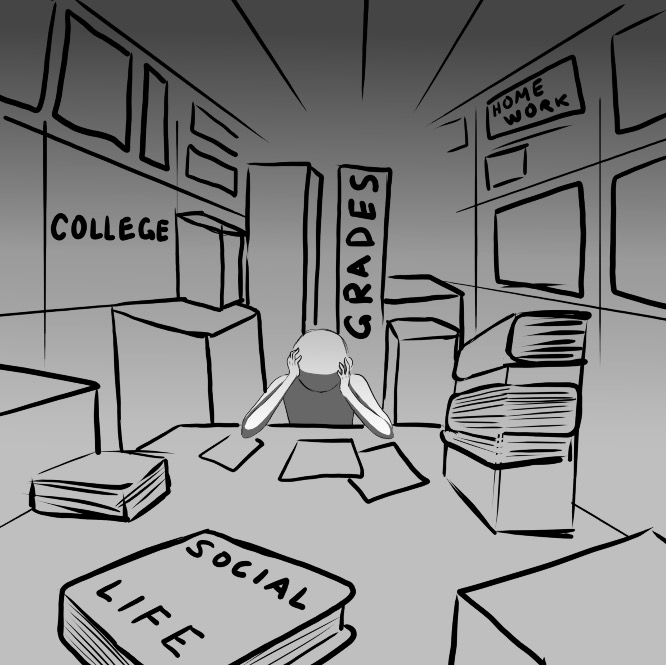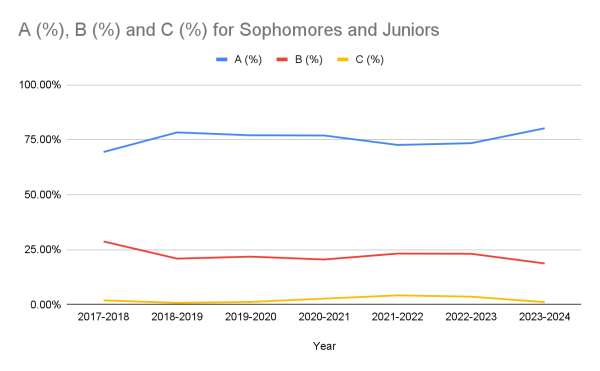Now We’re Stressed Out: Juniors Navigate Notoriously Busy Schedules
Junior year of high school is notoriously busy and stressful, and for Latin’s junior class, this year is no exception. Are Latin juniors too busy? Is the stress level too high?
“I think there is definitely an uptick in stress levels this year,” junior Daniel Radner said.
Classmate Callie Milner agreed, saying, “The most stressful thing is not having enough hours in the day to get everything done and get some sleep.” Callie’s observation about time pressure is a frequent complaint at Latin. Students are juggling a minimum of five classes, sports, extracurriculars, preparing for their standardized tests, and attempting to have some social life, all while trying to get in a few winks of sleep.
With homework consisting of problem sets, at-home written assignments, and preparing for in-class assessments, many students report homework taking hours—sleep-depriving hours—each and every night.
Junior year also brings the added job of preparing for standardized tests. Participating in high school athletics, at any level, means a student is unlikely to be home before 6 p.m., and that is assuming they live relatively close to school. Participating in theater requires countless hours of rehearsals and preparation. Participation in student publications, at any level, requires time writing, editing, and meeting. Participation in student government requires an often intense weekly time commitment as well.
Schedules are packed. Standards are high. Energy and enthusiasm abound. But at what cost in regards to stress?
This year’s junior class is in a unique position, having not been in a regular in-person school setting for almost the past two years. Callie sees some upside in the stress, saying, “It’s definitely stressful to be back to a regular busy schedule, especially with the addition of the college process, but after everything, I’m kind of happy to have the stress.”
Junior Brandon Shiffman feels similarly. “Junior year is a very exciting, yet extremely busy year,” he said. “In order to manage a full schedule of classes, sports, clubs, activities and test prep, I have found that planning out my weeks in advance keeps me on schedule and limits any unnecessary stress.”
Junior Bri Nourie also experiences the heightened stress. “I definitely feel that this year for juniors is more stressful than prior years.” Bri said. “Jumping into a full six blocks a day after a year of online school, especially junior year, has been a startling wake-up call for many students.”
She continued, “I feel that this post-online school year has caused me to overwork myself and not leave time for de-stressing, crucial to maintaining mental health during school.” Like Brandon, Bri found time management to be her most important tool. “Finishing all my work a day or two before it’s due has allowed me to catch up on my favorite books and TV shows, and left time to actually get a good night’s sleep,” she said. “Definitely important for absorbing all the logarithm laws and the steps of cellular respiration.”
Joe Edwards, 11th and 12th Grade Dean of Students, acknowledges the phenomenon of junior year stress. “For five years now,” he points out, “I have experienced a combination of factors impacting the academic stress levels of juniors.” Mr. Edwards explained, “First, the reality is that 11th grade courses are objectively harder than those of previous years. The work expected from students across subject areas is typically at a higher level of sophistication.”
“Additionally, the misconception that junior year is ‘the most important year’ motivates some students to overload their schedules in a way that is neither required nor recommended.”
Mr. Edwards also pointed to the college anxiety overflow from the seniors to the juniors. “Juniors have a front row seat to the senior class, who spend much of the fall semester in a swirl about their college applications.” He continued, “It’s easy for juniors to get caught up in that swirl and have it create undue academic pressure on themselves.”
For junior Madison Vanderbilt, the stress is at an unhealthy level. “Truthfully, much of junior year has sucked the life out of learning,” she said. “Whereas in past years when I felt truly engaged with the content, the pace of junior year has simply rushed me. I’ve felt encouraged to simply regurgitate what I’ve ‘learned’ instead of understanding and enjoying the process.”
For Madison, not only has the stress diminished the learning process, but it has taken a toll on her wellness. “This year could have been the most detrimental to both my physical and mental health if it weren’t for spending time with my friends, taking walks, or simply forcing myself to go to bed despite the mountains of work I had to complete,” she said.
Madison knows she’s not alone. “The worst part of this is I know I’m not the only person who feels this way,” she said. “Although I’m aware ‘junior year is a stressful one,’ at what expense? Students’ love of school? Joy? Passion? Health?”
Junior Elynor Starr said, “Junior year is one of the most stressful years because college becomes so much more real.” She added, “Our grades are incredibly important this semester; we’re taking SATs and ACTs and have to balance extracurriculars. The more I think about it, the more overwhelmed I feel, so I try to think about as little as I can without falling behind.”
Junior Emily Mendelson agreed with Madison and Elynor. “So far, junior year has by far been the most stress-provoking months of my high school experience,” Emily said. “I think the most stressful aspect of this year has been taking time for myself. During junior year, it seems like almost all of my time is dedicated to school work, SAT preparation and other activities that will ‘help me get into college.’ So, at times, I find it hard to simply relax.”
Latin faculty and administrators do not want stress to overwhelm students, and they emphasize wellness, balance, and a growth mindset. Mr. Edwards said, “Juniors should remember they are not walking their path alone.” He continued, “There is a huge team of people here to support students. Deans, counselors, learning specialists, advisors, teachers, Ms. Maajid, college counselors, and so many others are all here and ready to support. Lean on us when it’s needed, because we are here for you.”
Reaching out to a counselor or someone outside of school is one effective strategy, emphasized by Jane Knoche, the 11th and 12th Grade Guidance Counselor. Ms. Knoche wants students to know that she is a resource and that each student themselves is also a resource. Ms. Knoche stressed the importance of students helping each other as one of the most important strategies. “Use each other to lift each other up and be a supportive resource instead of seeing each other as competition,” Ms. Knoche recommends.
In addition to relying on the support network at Latin, Mr. Edwards offered four strategies to minimize stress:
Mr. Edwards walks the walk in being there for the high school students. Last semester, during the midterm crunch, he sent daily motivational emails to the student body. These emails were designed to minimize stress, distract, motivate, and remind students that nobody was alone. They also were designed to make students laugh.
However, junior Anna Hynes isn’t sure school can eliminate stress. “Honestly, I don’t think there’s much the school can do to reduce stress, as a main source of it comes from external factors,” she said. Anna has some strategies of her own. “I find that putting aside any amount of time for myself helps me to feel less stress when working.”
Junior Ben Flerlage offered another strategy. “I use activities outside of school (sports, time with family, etc.) to escape from the pressures of this year,” he said. Ben acknowledges, though, that despite this strategy, the workload is really intense. Ben admitted, “Weekends seem like a great time to relax, but I still end up doing hours of work from classes and outside of school activities.”
Junior Ryan Rose suggests no-homework weekends. “I wouldn’t be opposed to the no-homework weekends sometimes, especially when a lot of us are taking ACTs and SATs those weekends,” he said. “Homework on those weekends is just additional stress that needs to be handled.”
While most students interviewed for this article focused on academic stress, some cited different stressors. Spencer Stein said, “The one thing I really have to say is that I’m stressed about getting COVID, because the school doesn’t have a virtual option and I do feel that if I miss any classes, I’ll fall behind.”
As Bri Nouri noted, however, “We’re halfway there!” In fact, we’re more than halfway there. Spring is around the corner.

Matthew Kotcher ('23) is thrilled to continue to serve on The Forum as the Arts Editor and now as Director of Staff Recruitment and Development. Matthew,...
























































